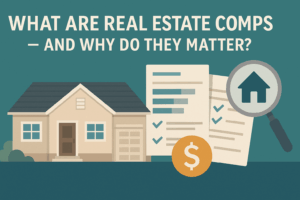
Are you facing the looming threat of foreclosure on your home? The stress and uncertainty that come with this situation can be overwhelming. However, there is hope. In this comprehensive guide, we will walk you through the process of selling your property fast to avoid foreclosure, providing you with the information you need to make informed decisions during this challenging time.
We’ll cover everything from understanding foreclosure to exploring your options and executing a successful sale strategy.
In Today’s Article
- Understanding Foreclosure
- Common Reasons for Falling Behind on Mortgage Payments
- Legal Implications of Foreclosure
- The Foreclosure Process Timeline
- Exploring Your Options
- What Should You Do Next for a Pre-Foreclosure Property Sale?
- Sell Your Property Fast to Avoid Foreclosure
- Government Assistance Programs
- Frequently Asked Questions
Understanding Foreclosure
Before diving into the details of how to successfully sell your property fast to avoid foreclosure, let’s first grasp what foreclosure is and how it works.
What Is Foreclosure?
Foreclosure is a legal process initiated by a mortgage lender or mortgage company when a homeowner fails to make their mortgage payments as agreed upon in the loan agreement. This process typically begins after several missed mortgage payments, and it can ultimately result in the forced sale of the property to recover the outstanding debt.
Common Reasons for Falling Behind on Mortgage Payments

Several factors can contribute to homeowners falling behind on their mortgage payments, ultimately leading to the foreclosure process:
- Financial Hardship: Sudden job loss, reduced income, unexpected medical expenses, or other financial hardship can make it challenging for homeowners to meet their mortgage obligations.
- Adjustable-Rate Mortgages (ARMs): Some homeowners choose adjustable-rate mortgages with initially low-interest rates that later adjust to higher rates. These adjustments can result in significantly higher monthly payments, making it difficult to keep up.
- Excessive Debt: High levels of consumer debt, such as credit card balances and personal loans, can strain a homeowner’s finances, making it harder to allocate funds for mortgage payments.
- Property Devaluation: A decline in property value can affect a homeowner’s ability to refinance or sell their home to cover the mortgage balance. In areas with declining property values, this can be a significant challenge.
- Divorce or Separation: Relationship changes can lead to financial instability, as payments may become the sole responsibility of one party, leading to difficulties in meeting the obligations.
- Health Issues: Unexpected medical expenses or disabilities that prevent homeowners from working can lead to financial distress, making it tough to pay the mortgage.
- Interest-Only Loans: Some homeowners have interest-only loans that require only interest payments for a set period before principal payments begin. Once principal payments kick in, monthly obligations increase substantially.
- Property Taxes and Insurance: Escrow accounts that cover property taxes and insurance can see adjustments that increase the overall mortgage payment, catching homeowners off guard.
- Job Relocation: Relocating for a job opportunity or other reasons can leave homeowners with two sets of housing expenses (mortgage on the old home and rent on the new one), straining their finances.
- Payment Resets: Homeowners with adjustable-rate mortgages or interest-only loans may face payment resets, where the mortgage terms change, leading to higher monthly payments.
Related Articles
- Can You Owe Money After Foreclosure in Texas? Understanding Deficiency Judgments
- Foreclosure in Texas: How to Protect Your Credit and Sell Your Home
- Essential Resources for Avoiding Foreclosure and Stopping Foreclosure in Texas
- Understanding the Difference Between Judicial and Non-Judicial Foreclosure
- Key Differences: Which Is Better Foreclosure or Short Sale?
- Sell Your House Fast and Avoid Foreclosure
Legal Implications of Foreclosure

Understanding the legal ramifications of foreclosure is vital. Foreclosure can have several significant legal consequences, including:
- Credit Score Impact: Foreclosure can seriously impact your credit score, causing it to plummet by several hundred points. This negative mark can remain on your credit report for up to seven years, making it challenging to secure future loans or credit.
- Deficiency Judgments: In some cases, if the property’s sale at auction does not cover the full outstanding mortgage balance, the lender may pursue a deficiency judgment against you. This means you could be held personally liable for the remaining debt, and your assets may be at risk.
- Difficulty in Future Loans: Foreclosure can make it challenging to obtain financing for future home purchases or other loans, as lenders may view you as a higher credit risk.
The Foreclosure Process Timeline
Foreclosure doesn’t happen overnight. The foreclosure process typically follows a timeline:
- Missed Payments: After your first missed payment, you’ll receive late notices from your lender.
- Notice of Default: After a certain number of missed payments, your lender will issue a Notice of Default (NOD). This document formally starts the foreclosure process.
- Pre-Foreclosure Period: You’ll enter a pre-foreclosure period, during which you can attempt to resolve the issue by catching up on payments, negotiating with your mortgage lender, or exploring other options.
- Foreclosure Auction: If you can’t resolve the issue during the pre-foreclosure period, your home may go up for auction. The highest bidder at the foreclosure auction will acquire the property.
- Post-Foreclosure: If the property doesn’t sell at auction, it becomes bank-owned or REO (Real Estate Owned) property.
Exploring Your Options

When faced with foreclosure, you have several options to consider. Each option has its pros and cons, and the best choice depends on your specific circumstances.
Loan Modification
A loan modification is a negotiated change to the terms of your existing mortgage, typically done with your lender’s cooperation. It aims to make your mortgage more affordable by adjusting your interest rate, extending the home loan term, or making other changes to help you avoid foreclosure.
✅Pros:
- Potential Monthly Savings: A successful loan modification can lead to reduced monthly mortgage payments, making it more affordable for you to stay in your home.
- Avoids Foreclosure: Loan modification can help you avoid the foreclosure process, allowing you to maintain homeownership.
- Credit Impact: While your credit may still be negatively affected, it’s generally less severe than the impact of foreclosure.
❌Cons:
- Complex Process: The loan modification process can be complex and time-consuming, requiring extensive paperwork and documentation.
- Approval Not Guaranteed: There’s no guarantee that your lender will approve your modification request, and if they do, the terms may not be as favorable as you hope.
- Temporary Solution: Loan modifications are often temporary, with adjusted rates or payments for a limited time. This means your financial struggles may persist in the long run.
Short Sale
A short sale is a real estate transaction in which the homeowner sells their property for less than the outstanding mortgage balance if the lender agrees. It is typically used as a means to avoid foreclosure and mitigate financial loss for both the homeowner and the lender.
✅Pros:
- Avoids Foreclosure: A short sale allows you to avoid the full foreclosure process and its associated impact on your credit.
- Debt Forgiveness: In some cases, the mortgage company may forgive the remaining mortgage debt after the short sale, relieving you of further financial obligation.
- Fresh Start: A successful short sale can provide a fresh start and the opportunity to rebuild your finances without the burden of an unaffordable mortgage.
❌Cons:
- Credit Impact: While less severe than foreclosure, a short sale will still have a negative impact on your credit score.
- Tax Consequences: The forgiven debt in a short sale may be considered taxable income, potentially leading to a tax liability.
- Approval Required: Short sales require lender approval, and the process can be lengthy and uncertain.

TX Cash Home Buyers Gives Multiple Offer Options!
Unlock the potential of your home with our multiple offer options. Discover what you qualify for and make informed decisions with confidence.
Deed in Lieu of Foreclosure
A Deed in Lieu of Foreclosure is a voluntary agreement between a homeowner and their mortgage lender. In this arrangement, the homeowner transfers ownership of the property to the lender in exchange for the cancellation of the mortgage loan. It is an option used by many homeowners to avoid the formal foreclosure process and its associated legal proceedings.
✅Pros:
- Avoids Foreclosure: Deed in lieu allows you to avoid the foreclosure process and its associated legal proceedings.
- Potentially Less Damaging Credit Impact: While it can still harm your credit, the impact may be less severe than a foreclosure sale on your credit report.
- Faster Resolution: It can be a quicker resolution compared to a foreclosure.
❌Cons:
- Lender Approval: Your mortgage company must approve the deed in lieu arrangement, and they may not always agree to it.
- Loss of Equity: You may lose any equity in the property, and the lender might require you to pay any deficiency between the sale price and the outstanding mortgage balance.
- Tax Implications: Similar to a short sale, there may be tax implications related to forgiven debt.
Bankruptcy
Bankruptcy is a legal process that allows individuals or businesses struggling with overwhelming debt to seek relief by either restructuring their debts or, in some cases, having certain debts discharged entirely.
This process to file bankruptcy is typically initiated through a court filing and can have long-term financial and legal implications. In some instances, bankruptcy can provide temporary relief from creditors and halt foreclosure proceedings.
✅Pros:
- Automatic Stay: Filing for bankruptcy initiates an automatic stay, temporarily halting foreclosure proceedings.
- Debt Restructuring: Bankruptcy can help restructure your debts, potentially making it more manageable to keep your home.
- Financial Relief: It can provide temporary relief from overwhelming debt and financial stress.
❌Cons:
- Long-Term Consequences: Bankruptcy has long-term consequences on your credit, making it challenging to secure loans or credit in the future.
- Limited Impact on Mortgage: While it may provide temporary relief, bankruptcy may not always result in a favorable long-term solution for your mortgage.
- Complex Legal Process: Bankruptcy is a complex legal process that requires legal representation and can be expensive.
What Should You Do Next for a Pre-Foreclosure Property Sale?
Don’t lose hope; it’s time to take proactive steps! Follow these crucial guidelines for a successful pre-foreclosure property sale:
- Assess Your Property’s Approximate Value Utilize an online tool to quickly estimate the value of your property. Remember, this estimate is a starting point and initial reference for your calculations. However, it’s essential to consult with an expert to determine your property’s final selling price.
- Calculate Your Mortgage Debt and Late Charges Reach out to your lender to obtain a precise figure for your outstanding mortgage debt, including any accrued late fees. Foreclosure notices often indicate several missed payments. When selling your property, you’ll need to settle this debt along with any additional late charges. Typically, mortgage lenders impose late fees 10-15 days after the first missed payment. Additionally, review any recent communications from your bank concerning foreclosure to determine the outstanding principal, interest, and fees. Deduct this amount from your estimated sale price.
- Factor in Selling Costs Selling a property incurs various expenses. Deduct fees associated with staging, property preparation, realtor commissions, closing costs, seller concessions, and moving expenditures from the final sale price.
With some luck, you might find yourself in a favorable financial position, even with extra funds on hand. However, if the sale proceeds won’t cover your mortgage and related expenses, your next option may involve contributing additional funds at the closing. If this isn’t feasible, you may need to consider a short sale.
Sell Your Property Fast to Avoid Foreclosure

If you’ve decided that selling your house quickly is the best option to avoid financial trouble and foreclosure, here’s are some options and tips to navigate the home sale process successfully:
1. Selling with a Real Estate Agent
One common approach to selling a house in foreclosure is to enlist the services of a real estate agent. Here are the pros and cons of this method:
✅Pros:
- Expertise and Guidance: Real estate agents bring in-depth knowledge of the local market, pricing trends, and negotiation skills to the table.
- Extensive Network: They have access to a broad network of potential buyers and can market your property effectively.
- Market Exposure: Agents can list your property on multiple listing services (MLS) and other platforms, increasing its visibility.
- Professional Representation: They handle negotiations, paperwork, and legalities on your behalf, ensuring a smooth transaction.
❌Cons:
- Commission Fees: Real estate agents typically charge a commission fee, which can range from 5% to 6% of the sale price.
- Time-Consuming: The traditional sales process may take several months to complete, which might not align with your need for a quick sale.

Why Sell Your House To TX Cash Home Buyers?
1. You Pay Zero Fees
2. Close Quickly or the date of your choice
3. Guaranteed Offer
4. No repairs required, we buy as is
5. Less Hassles!
Call Now (281) 595-7550 Send Text
2. Selling to a Real Estate Investor
Another option to sell your property fast is to consider a real estate investor or cash buyer. Here are the pros and cons of this method:
✅Pros:
- Speed: Home investors can often close the deal within a matter of days or weeks, providing you with a quick exit strategy to avoid foreclosure.
- As-Is Sales: Investors typically purchase properties in their current condition, saving you the time and money needed for repairs and renovations.
- No Commissions: Selling to an investor typically involves no realtor commissions or closing costs, saving you a significant portion of your potential profits.
- Certainty: Investors can provide a no obligation cash offer, reducing the risk of the deal falling through due to financing issues.
❌Cons:
- Lower Sale Price: Investors may offer less than market value for your property since they are taking on the risk and providing a fast solution to your financial situation.
- Limited Negotiation: You may have limited room for negotiation when dealing with cash buyers, as they typically make non-negotiable cash offers.
- Due Diligence: Ensure you research the investor or company thoroughly to avoid potential scams or unscrupulous buyers.
Choosing between a real estate agent and a home investor depends on your specific circumstances and priorities. If you prioritize speed and convenience and are willing to accept a potentially lower sale price, then selling your home to a home investor may be the right choice.
On the other hand, if you’re looking to maximize your sale proceeds and are comfortable with a longer sales process, working with a realtor could be the better option.
Consider discussing your situation with both real estate professionals and home investors to weigh your choices and make an informed decision that aligns with your financial situation and goals during this time sensitive process.
Tips for Selling Your Property Fast
Selling your house quickly to avoid foreclosure requires strategic planning and presentation. Here are some tips to help you make your property more appealing to potential home buyers:
- Enhance Curb Appeal: First impressions matter. Invest in landscaping, paint the front door, and ensure the exterior looks inviting.
- Declutter and Depersonalize: Remove personal items and excess clutter to help buyers envision themselves living in the space.
- Make Necessary Repairs: Fix any glaring issues like leaky faucets, broken windows, or electrical problems. A well-maintained home is more likely to sell quickly.
- Set the Right Price: Work with a real estate agent or appraiser to determine a competitive and realistic asking price.
- Stage Your Home: Consider professional home staging or rearrange furniture to highlight your home’s best features.
- Quality Photos and Listings: Ensure high-quality photos and detailed property descriptions in your online listings. Most buyers start their search online.
- Flexible Viewing Schedule: Be accommodating with showings to allow potential buyers to visit at their convenience.
- Marketing Strategy: Discuss marketing plans with your real estate agent, including online and offline strategies to attract buyers.
Government Assistance Programs
In addition to the options discussed above, it’s essential to be aware of government assistance programs designed to help homeowners facing foreclosure.
These programs can provide valuable resources and support when struggling financially.
For example, the U.S. Department of Housing and Urban Development (HUD) offers counseling services through HUD-approved agencies, which can provide guidance on avoiding foreclosure, loan modification assistance, and other foreclosure prevention strategies.
Furthermore, specific state and local government programs may offer financial assistance, legal aid, or foreclosure mediation services to eligible homeowners.
Exploring these programs can provide an additional layer of support as you navigate the foreclosure avoidance process.
Conclusion-“Sell My House Fast Foreclosure”
In this guide, we’ve provided a comprehensive overview of how to sell your home and avoid foreclosure. From understanding the foreclosure process to exploring various options to stop foreclosure, like loan modification, short sales, deeds in lieu, bankruptcy, and quick home sales, we’ve covered the essentials.
Selling your house quickly can be a viable strategy, either with a real estate agent for a traditional home sale or through a home investor for a faster solution. To maximize success, focus on enhancing your property’s appeal and setting the right price.
Additionally, remember to explore government assistance programs such as those offered by HUD and local authorities. These programs can offer crucial support during foreclosure crises.
By staying informed, considering your options wisely, and seeking professional advice as needed, you can take the right steps to protect your home when facing foreclosure. Your journey to avoid foreclosure starts with knowledge and informed choices.
Best of luck in your endeavors.
Frequently Asked Questions
Which type of foreclosure is faster?
The foreclosure process can vary depending on factors such as state laws and individual circumstances. Generally, a non-judicial foreclosure is often faster than a judicial foreclosure because it doesn’t require court involvement. However, specific timelines can still vary widely.
Which one is the best way to prevent foreclosure?
The best way to prevent foreclosure depends on your unique situation. However, proactive steps such as loan modification, refinancing, or selling your home quickly through a realtor or investor can be effective strategies.
The optimal choice depends on your financial circumstances and goals.
What type of foreclosure sale allows a property to be sold?
A non-judicial foreclosure sale, also known as a foreclosure by power of sale, allows a property to be sold without court involvement.
This type of foreclosure typically proceeds more quickly than a judicial foreclosure, which involves court proceedings. However, the specifics can vary by state laws and mortgage agreements.
Disclaimer:
The content provided on this blog is for informational purposes only. We are not attorneys or tax professionals. For personalized legal or tax advice, please consult with a qualified professional.
Written by Lisa Martinez, Founder of TX Cash Home Buyers

About The Company
TX Cash Home Buyers helps Texas homeowners sell quickly and simply — even in tough situations like repairs, inherited homes, or financial stress. Founded by Lisa Martinez, we’re known for our local experience, fair offers, and commitment to guiding sellers through off-market sales with clarity and care.




